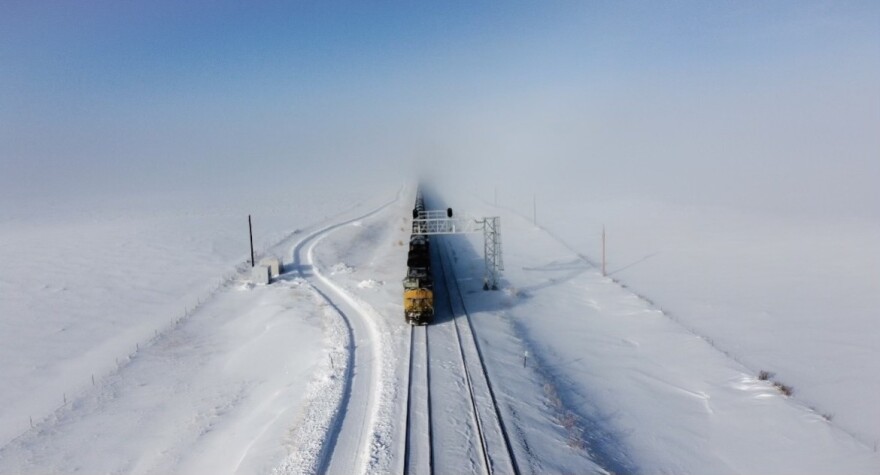Among the many things included in the GOP spending bill, signed into law in early July, was a break to the coal industry. The idea is to entice companies to ramp up coal production by lowering fees for mining on public lands.
Here’s the thing though: Those fees go to both the federal government and states. And in the top producing coal state in the country, less coal revenue could mean a sizable financial hit.
To understand why some Wyoming lawmakers are not that excited about the GOP policy bill, we have to take a second to remember just how important coal is to the state.
A 2007 documentary from Pentrex Train Videos described it this way: “Come along for a visit to a land where coal is king.”

Over the last 50 years, the state of Wyoming made bank from coal – billions of dollars to fund the government, schools, roads and parks. The state now has its own sovereign wealth fund thanks to coal.
Here’s how it works: When coal is mined on federal land, the mining company pays royalty fees. Half of those royalties go to the federal government and the other half goes to the state, and only Congress has the power to change that ratio.
President Trump’s GOP spending bill lowers those royalty fees for mining companies from 12.5% to 7% through 2034.
State principle economist Dylan Bainer said that might be a great deal for coal companies.
“The goal of this bill is to try to incentivize people to produce and, as he said, ‘drill, baby, drill,’” Bainer said. “On the surface, sounds great for Wyoming. But the way that it is being done is going to negatively impact our revenues.”
The loss to Wyoming’s state budget is an estimated $50 million a year.

“While it might not seem like a huge number relative to overall budget numbers, a few million dollars less in funding for some entities could lead to potential budget issues,” Bainer said.
He added that $50 million is about 8.5% of what Wyoming makes each year off federal minerals, like oil, gas and coal.
“I know that was not the intent,” said Rep. Robert Wharff (R-Evanston) to his fellow lawmakers during a recent Select Federal Natural Resources Management Committee. “Everybody said how this is such a great thing for our state.”
In a state that had the highest margin of votes for Trump’s presidency, there’s big support for his vision to prop up the coal industry. But there is a lot of uncertainty that this is the way to do it.
Demand for Wyoming’s coal has been dropping for well over 15 years.
GOP congressional members say the lower rates will help revitalize the declining industry. But local lawmakers, like Wharff, worry that shift could take time.
“If it's going to take us multiple years to see that – I don't know,” Wharff said.

So he and his colleagues are trying to get creative to offset that $50 million loss in annual state revenue.
Rep. Bob Ide (R-Casper) pointed to Alaska. It gets a bigger share of royalty fees for oil and gas.
“Alaska actually has a 90-10 split, and they got that at statehood,” he said.
Ide is hoping Wyoming can ask Congress to give his state a better deal, but any state legislation is months out. Ide also brought up his ideal solution.
“We looked at a federal land transfer, which would solve all of those problems,” he said.
Wyoming has tried to get ahold of federal land – and the mineral rights beneath it – for years, long before Utah Sen. Mike Lee’s public land sell off proposal from earlier this summer. But it’s never been successful.
Aside from the spending bill, the Trump administration recently approved mine expansions for Campbell County’s West Antelope III and Sweetwater County’s Black Butte. That could be a good thing for those mining communities.
“That would lead to maybe a ripple effect in terms of restaurant activity, lodging activity, stuff like that, retail activity,” state economist Bainer said.
Trump is hoping to reopen land to new coal leasing, like northeast Wyoming’s Powder River Basin. Ideally, bringing the area back to its former production heyday.
But will the market support it? And would an increase in coal production offset the state’s revenue loss? Some economists and lawmakers aren’t so sure.








